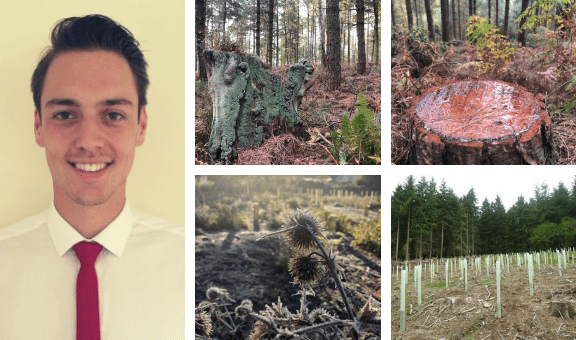What Future for the Forests? by Southern England Forest Manager Alex MacKinnon
A change in my work role has got me thinking about the past, present and future of forestry in this part of the country.
I wonder, as a very traditional industry, are we threatened by modern times in all three rapidly changing social, economic and environmental climates? Or are we primed to deliver the future…?
My colleague, Andy Baker, recently attended Confor’s event ‘Superwood: Forestry in a Low Carbon Economy’ and came back with an opinion very much in line with the latter. I’m glad people can be so confident. I wholeheartedly agree that forests and timber provide so many of the things the modern age is desperately lacking – Carbon sequestration, local resources, Shinrin-Yoku (Forest bathing), flood abatement, air purification, I could go on. Living in Surrey – with the highest proportion of tree cover in all of England (22%), I do feel we easily take for granted these everyday benefits.
Considering the future and how to improve and grow the business, an analytical approach leads me to ask, what has changed over time to get us to this point? While many more experienced foresters would have a deeper understanding of this, this is mine:
The role of a modern-day forester may have been born along with large landownership models whereby peerages and estates were handed to individuals for service to queen and country. We now live in a far more detailed jigsaw of landownership thus reducing the number of large forest estates that qualify for professional management. Coming from Scotland as I do, the difference is stark. The thousands and hundreds of thousands of hectares under single ownership at one end of the UK fragment into the hundreds and tens at this end.
So, are we destined for a further fragmented landownership model whereby foresters will be acting for more smaller and smaller landholdings or perhaps a revival of the past monopoly?
The skills base that once existed for forestry is similarly disintegrated. I think most in the industry take the risk of a widening skills gap very seriously. To address this, Tilhill Forestry recently launched into a partnership with the welsh agricultural college Coleg Cambria Llysfasi to create a unique career path into forestry with a blend of education, industrial experience and bespoke training underpinned by the National Apprenticeship Scheme.
Moreover, the scandalous lack of planting new woodlands bears a burden on the industry. While whispers of a new Environmental Land Management pilot scheme offers a glimmer of hope to planting and management alike, I can’t help but feel a more fundamental change is needed to overcome the planting issue.
Will those that are able please take note and launch us into a new age of planting and appropriate land management? If it did happen, I agree our roles could be in high demand and short supply.
I’m afraid that poses more questions than answers, but does offer something to think about in this reflective period of the new year.



